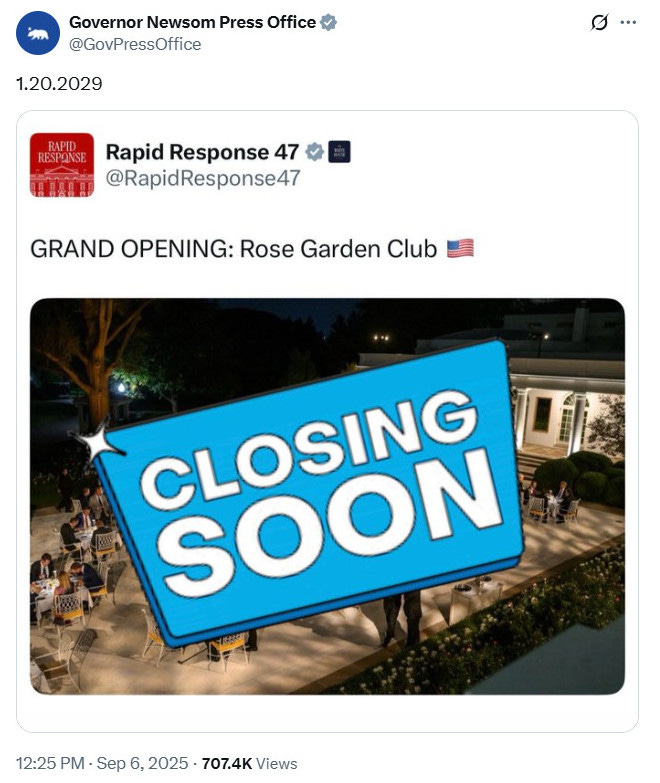Chicago under militarization threat as authoritarianism grows
The David Pakman Show - September 8, 2025
Already a website member? Watch the show commercial-free here | Want to become a member? Sign up here
Protests against Donald Trump in Washington, D.C., are intensifying, with activists adopting decentralized, daily tactics that are difficult to suppress. Instead of large marches, demonstrators are using banners, mobile billboards, and projected messages, all coordinated through apps like WhatsApp and Signal. These repeated, small actions maintain visibility and amplify social media coverage more effectively than traditional protests.
Trump’s heavy-handed responses, including National Guard deployment and federal agents, appear to energize protesters and may even draw moderates to the cause. Organizers are preparing for a major escalation on October 18, which could mark a turning point in the resistance against his presidency.
In national politics, speculation around the 2028 Democratic presidential primary is already beginning. California Governor Gavin Newsom’s office recently posted an image referencing January 20, 2029, hinting at a potential presidential run. Meanwhile, Maryland Governor Wes Moore has ruled out a 2028 bid.
Trump has also escalated his use of federal power by threatening to deploy troops to Chicago, despite opposition from Mayor Brandon Johnson and Governor JB Pritzker. Chicago officials are preparing to resist, emphasizing that federalized National Guard troops are legally limited to protecting federal buildings, countering Trump’s authoritarian tactics without direct confrontation.
U.S. farmers are again facing severe economic strain due to Trump’s tariffs, echoing struggles from his first term. Agriculture is critical to national security, food supply, trade, transportation, and public health, making the crisis particularly alarming. Some farmers have been driven to prayer in desperation, highlighting the tension between respecting voter choice—since many supported Trump—and protecting an essential industry from repeated policy failures.
At the US Open, thousands of fans booed Trump despite efforts by the U.S. Tennis Association to suppress negative reactions. Cell phone footage captured the uncensored crowd response, underscoring Trump’s authoritarian desire to control optics and contrasting with how dictators like Kim Jong Un stage sports events.
Finally, House Speaker Mike Johnson claimed that Trump was an FBI informant in relation to Jeffrey Epstein. Johnson’s phrasing misrepresents a decades-old story in which Trump passed information to authorities, as there is no evidence of a formal informant relationship. The claim contradicts decades of MAGA rhetoric demonizing FBI informants and serves as a misleading attempt to recast Trump’s actions in a favorable light.
On today’s bonus show:
Thomas Massie’s push to release the Epstein files puts him in conflict with Trump-aligned Republicans. Meanwhile, Democrats are promoting younger candidates to drive generational change, while Republicans show little concern for age. And some food makers are phasing out artificial dyes, echoing calls from Robert F. Kennedy Jr. and the MAHA crowd.
Already a website member? Watch the bonus show here | Want to become a member? Sign up here




Authoritarianism is on the rise all over the world and we're next. I hate to tell ya. Monopoly capitalism is why...as long as we keep giving billionaires more money they get more powerful. It creates dicktaters and authoritarian fascistic regimes.You only need to remember Trump's inauguration. The richest scum in this country flocked and fawned around him...this was not by accident. This was corporate rule in the making. Watch or read any sci-fi movie show or novel ... the not too distant future is bleak dystopian and fascist with one government a small handful of mega conglomerates and millions of slaves laboring for survival( that's you btw).Trump and a cabal of dicktaters are all working together to this end ( if you're paying attention).
This is only the beginning.
I know some people don't like Bill Maher anymore but he made a great point about why don't the police feel pissed off. Is Trump saying they can't handle their jobs and take care of their own cities? I would feel offended. Especially if when you come to my "deathtrap" city all you are doing is picking up garbage and sleeping on a floor somewhere.